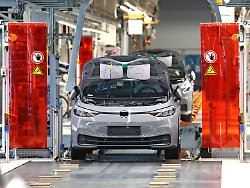The German auto industry is deeply in crisis, and not just since Corona. Above all, the survival of many medium-sized suppliers is at stake. The company and the union are demanding more help, and even the Green leader shows understanding.
Before the top auto meeting on Tuesday with Chancellor Angela Merkel, additional state aid for the industry is under discussion again. Greens and IG Metall are calling for a state fund that is involved, for example, with suppliers who have been plagued by the Corona crisis. The head of the Cologne-based car manufacturer Ford, Gunnar Herrmann, again spoke out in favor of a purchase bonus for cars with economical combustion engines.
The Association of the Automotive Industry (VDA) does not see the crisis in the sector as over by a long way. "The situation for many companies is still tense," said VDA President Hildegard Müller. "That is why the exchange between companies, trade unions and politics is so important." Concrete resolutions are not to be expected. Above all, it is about strategic questions about the future of the industry, such as digitization, networking and autonomous driving. In order for the "mobility of the future" to pick up speed, the political, infrastructural and legal prerequisites would have to be created, said Müller. It is about how Germany can further expand its strong position worldwide in connected and automated driving. The German automotive industry will invest around 25 billion euros in digitization by 2024.
The demand for cars collapsed during the Corona crisis. In June, in the debate about an economic stimulus package, the industry demanded state purchase premiums for modern gasoline and diesel cars in order to boost demand. But this failed because of the resistance, especially from the SPD. The coalition decided on higher government premiums for the purchase of electric cars. In addition, the reduction in VAT should stimulate demand. Significantly more new e-cars have recently been registered.
The IG Metall chairman Jörg Hofmann advocated a state "SME and transformation fund" that invests in companies in need. "If the state assumes part of the risk, the small and medium-sized enterprise could provide the strength to invest and innovate," said Hofmann of the "Frankfurter Allgemeine Sonntagszeitung". Greens boss Annalena Baerbock said: "We have to buy medium-sized companies and suppliers time." In view of the more than 800,000 employees in the automotive industry, "no politician can say: I don't care, let them see how they get by".
German industry can produce millions of e-cars
"The slump in sales due to the corona pandemic is currently a cause for concern for all manufacturers," said Herrmann to the "Kölner Stadt-Anzeiger". "The planning of vehicle production is currently made massively more difficult by the one-sided funding of electromobility alone, which customers are still skeptical about due to the inadequate charging infrastructure," he added. After the federal government had decided in this way, however, he sees "currently no feasibility of a general purchase bonus".
The environmental association BUND continues to reject purchase subsidies for combustion engines. A purchase bonus for combustion engines to sell off stocks would only benefit the car companies that are already in good financial shape. "The suppliers go away empty-handed because the cars have already been produced," said traffic expert for the environmental association BUND, Jens Hilgenberg, of the dpa. Anyone who wants to help the supplier industry has to support them in breaking their dependence on the automotive industry in general and on the combustion engine in particular with new products.
In the opinion of IG Metall boss Hofmann, German manufacturers do not have to hide from the US manufacturer Tesla when building electric cars. "Tesla doesn't have to show us how electric cars go," Hofmann told the FAS. "While Tesla is just building its factory in Brandenburg on a highly subsidized basis, e-mobility is already being produced 200 kilometers south in the Zwickau VW plant, in significantly higher numbers." The German auto industry will be able to produce 1.5 million electric vehicles next year.
Tesla boss Elon Musk first visited the construction site of his planned electric car factory in Grünheide near Berlin on Thursday. Federal Research Minister Anja Karliczek described Musk in the "Passauer Neue Presse" as "an impressive person. He shows how a company can realize visions." But there are also similar personalities in Germany and Europe.
. (tagsToTranslate) Economy (t) Car manufacturer (t) Auto industry (t) Corona crisis (t) Scrapping premium
